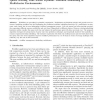Free Online Productivity Tools
i2Speak
i2Symbol
i2OCR
iTex2Img
iWeb2Print
iWeb2Shot
i2Type
iPdf2Split
iPdf2Merge
i2Bopomofo
i2Arabic
i2Style
i2Image
i2PDF
iLatex2Rtf
Sci2ools
137
click to vote
JCST
2010
2010
Queue Waiting Time Aware Dynamic Workflow Scheduling in Multicluster Environments
Abstract Workflows are prevailing in scientific computation. Multicluster environments emerge and provide more resources, benefiting workflows but also challenging the traditional workflow scheduling heuristics. In a multicluster environment, each cluster has its own independent workload management system. Jobs are queued up before getting executed, they experience different resource availability and wait time if dispatched to different clusters. However, existing scheduling heuristics neither consider the queue wait time nor balance the performance gain with data movement cost. The proposed algorithm leverages the advancement of queue wait time prediction techniques and empirically studies if the tunability of resource requirements helps scheduling. The extensive experiment with both real workload traces and test bench shows that the queue wait time aware algorithm improves workflow performance by 3 to 10 times in terms of average makespan with relatively very low cost of data movemen...
JCST 2010 | Queue Wait Time | Wait Time | Workflow |
Related Content
| Added | 19 May 2011 |
| Updated | 19 May 2011 |
| Type | Journal |
| Year | 2010 |
| Where | JCST |
| Authors | Zhi-Feng Yu, Wei-Song Shi |
Comments (0)

